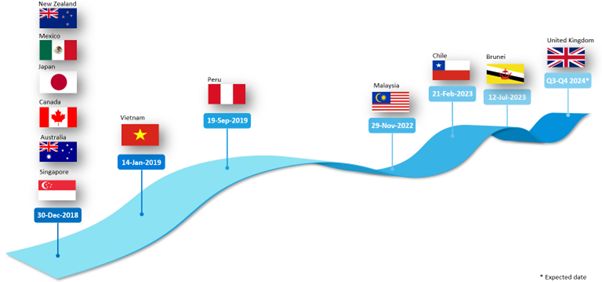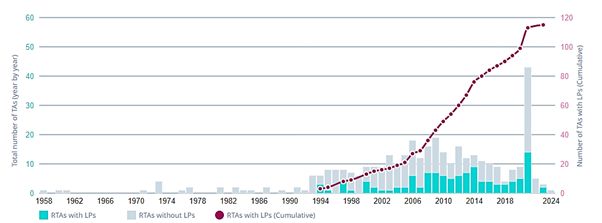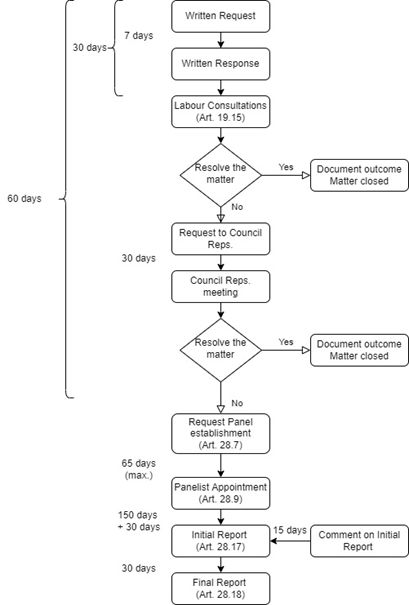- within Employment and HR topic(s)
- within Criminal Law, Environment and Finance and Banking topic(s)
- in Turkey
This article is the second of a series analysing the Comprehensive and Progressive Agreement for Trans-Pacific Partnership (also referred to as "the CPTPP" or "the Agreement") and its implications for UK businesses. This second article explores the labour provisions of the CPTPP which are the subject of a dedicated chapter of the Agreement (Chapter 19). As highlighted in Part 11, the UK signed the Protocol of Accession to the CPTPP in July 2023 and the Agreement received Royal Assent in March 2024. With the entry into force of the Agreement expected in the second half of 2024, it is key for UK businesses to understand the implications of key provisions of the Agreement.
Figure 1: Entry into force of the CPTPP

Source: International Economics Consulting Ltd
Labour protection is an important area of law that aims to promote decent work by addressing economic, temporal and physical aspects of the work environment.2 Labour provisions have become an increasingly common component of modern free trade agreements (FTAs), emphasising the need to ensure that labour rights are protected in the jurisdictions of trading partners. At the time of writing of this article, 115 out of 368 trade agreements included labour provisions, about half of which were ratified in the past decade.
Figure 2: FTAs with labour provisions, 1958-2024

Source: ILO Labour Provisions in Trade Agreements Hub (LP Hub)
The CPTPP is one of the "deep trade agreements" which goes beyond the traditional market access preferences to include provisions fostering inclusivity and environmentally sustainability. To this end, the Labour Chapter of the CPTPP is designed to uphold labour protection standards, enhance transparency on labour matters, promote enforcement of labour rights, foster public cooperation and cooperation on labour issues, the enforcement of which is fostered via a strong dispute settlement mechanism.
Upholding Labour Protection Standards
Article 19.3 on Labour Rights sets binding obligations on CPTPP Parties to maintain or adopt legislation to ensure the protection of internationally recognised labour rights enshrined in the International Labour Organisation (ILO) Declaration on Fundamental Principles and Rights at Work. These labour rights, which are based on internationally recognised labour standards, include freedom of association and collective bargaining; elimination of compulsory labour; abolition of child labour; and elimination of discrimination in respect of employment and occupation (including discrimination against women). The CPTPP also requires Parties to enact and maintain laws governing acceptable conditions of work, which cover minimum wages, hours of work, and occupational health and safety. It should be noted that the CPTPP does not require Parties to ratify the ILO conventions related to labour rights, but instead it sets obligations to adopt and maintain domestic regulations to protect the fundamental labour rights (Table 1).
Table 1: Labour Rights under the CPTPP
| Labour rights | Description |
|---|---|
| Elimination of forced labour | Forced or compulsory labour is "all work or service which is exacted from any person under the threat of a penalty and for which the person has not offered himself or herself voluntarily."3 |
| Elimination of child labour | Child labour is defined as "work that deprives children of their childhood, their potential and dignity, and is harmful to physical and mental development."4 |
| Elimination of discrimination at work | Discrimination at work occurs when employees are treated less favourably based on factors that are not related to their merit, job requirements or competence.5 Freedom from discrimination is a fundamental right, and all employees should be protected from discrimination. |
| Freedom of association | Freedom of association is crucial to workers and employers and gives them the opportunity to form independent organisations that can facilitate collective bargaining as well as improve social dialogue.6 |
| Conditions of work | Working conditions include several aspects, such as hours of work, minimum wage, and working environment. The ILO sets out various standards for maintaining acceptable working conditions. |
Source: International Economics Consulting based on CPTPP, Chapter 19, Art. 19.1
Article 19.4 on Non Derogation prohibits Parties from weakening the protections afforded to workers under their labour laws to inappropriately encourage trade or investment. Regarding enforcement, Article 19.5 stipulates that Parties have committed to effectively enforce their labour laws after the Agreement has entered into force and that a lack of enforcement cannot be justified on the grounds of resource allocation.
Furthermore, Article 19.6 promotes initiatives to discourage the importation of goods produced by forced or compulsory labour, including child labour. Article 19.7 on Corporate Social Responsibility (CSR) also encourages Parties to motivate businesses in their territories to voluntarily adopt CSR initiatives related to labour issues, such as the UN Global Compact on corporate sustainability initiative.
Enhancing Transparency and Due Process in Enforcement of Labour Rights
To enhance transparency, Article 19.8 on Public Awareness and Procedural Guarantees requires Parties to make labour laws and regulations, including to information about labour laws, enforcement mechanisms related to these labour laws, and compliance procedures, publicly available so that stakeholders can access them in a timely manner. Additionally, it obligates each Party to ensure that interested persons have access to independent and impartial enforcement tribunals for enforcement of their labour rights. Further, Parties must ensure that enforcement of labour laws is fair, equitable, and transparent, follows due process of laws, and does not entail unwarranted delays and fees. Parties also must ensure that each person has the right to defend their case, and final decisions are to be made based on the merit of the case. Each person should also be given the right to all legal remedies, including the right to review and appeal, and remedies must be executed in a timely manner. CPTPP Parties are also required to have procedures in place to enforce the final decisions of their respective tribunals effectively.
Fostering Public Engagement and Cooperation
The CPTPP provides several avenues for promoting public engagement and cooperation. Article 19.10 outlines a framework for cooperation among CPTPP Parties and recognises that effective implementation of the Labour Chapter requires collaborative efforts among Parties, guided by principles including consideration of a Party's priorities, level of development and resources among others.
Article 19.10 also stipulates that each Party shall invite the views and, as appropriate, participation of its stakeholders, including worker and employer representatives, in identifying potential areas for cooperation and undertaking cooperative activities. Additionally, Article 19.10 further encourages cooperation in the promotion of equality and elimination of discrimination in respect of employment and occupation for migrant workers, or in the areas of age, disability and other characteristics not related to merit or the requirements of employment, and protection of vulnerable workers, including migrant workers, and low-waged, casual, or contingent workers.
Article 19.11 requires public participation in Parties' Cooperative Labour Dialogue, through a channel for information exchange among CPTPP Parties on any matters arising under the Labour Chapter. To request for dialogue with another Party, a written submission must be made to the relevant Contact Point. Dialogues can be held in person or through any other technological means available to the concerned Parties.
Per Article 19.13, Parties are obliged to establish Contact Points to address matters under the Labour Chapter. These contact points should be designated within 90 days of entry into force of the Agreement, and they act as the primary form of engagement between CPTPP Parties on labour matters, as well as a channel for communication with the public. Through the relevant contact points and in accordance with domestic procedures, the CPTPP, via Article 19.9, allows the public to lodge written submissions on matters related to the Labour Chapter.
Article 19.12 establishes the Labour Council which comprises senior governmental representatives designated by each Party. The Council responsibilities include establishing and reviewing priorities for labour cooperation and capacity-building activities, facilitating public participation and increasing awareness about the Labour Chapter and reviewing reports from the contact points designated under Article 19.13 among others. In the fifth year of implementation or as may be decided by the Parties, the Council is tasked with conducting a review of the Chapter's implementation and reporting findings to the Commission.
Article 19.14 also obligates Parties to establish or maintain a national labour consultative or advisory body, or similar mechanism, for members of the public to provide their views on matters related to the Labour Chapter.
Dispute Settlement
The CPTPP is among the few FTAs with binding provisions on labour protection standards, violations of which are subject to dispute settlement. Through Article 19.15, the CPTPP integrates dispute settlement provisions related to labour in the form of labour consultations. Parties can request consultations on labour-related matters arising under the implementation of the Agreement to find mutually agreed solutions. Should consultations at the Contact Points or Council Representatives levels fail to reach an agreement after 60 days following the receipt of the consultation request, the general Dispute Settlement Mechanism (DSM) under Chapter 28 of the Agreement applies, which includes setting up a panel to resolve the dispute. However, the Parties may not resort to the general DSM until they have exhausted consultations, as provided under Article 19.15. Figure 3 below illustrates the DSM for labour disputes under the CPTPP. If the final report of the Panel determines that there is a violation, the responding Party is required, whenever possible, to eliminate that violation within a reasonable period of time. In cases where the responding Party fails to fix the violation identified by the Panel, the complaining Party may suspend benefits under the Agreement, request compensation or the responding Party can offer the payment of a monetary assessment. Nonetheless, the latter are temporary measures that shall be applied until the responding Party fully implements actions to correct the violation identified.
Figure 3: Labour Dispute Resolution under the CPTPP

Source: International Economics Consulting (2022)
Implications for UK Businesses
The CPTPP labour obligations enable the UK to continue upholding and protecting established labour standards. The Agreement also establishes a broad set of labour obligations for the UK's CPTPP trading partners, surpassing the commitments previously achieved in the bilateral FTAs with these partners. Furthermore, the CPTPP DSM provides the UK with the ability to enforce the labour obligations that have been negotiated. It is key for UK businesses to understand the mechanisms that the Agreement provides for public engagement and dispute settlement to fully leverage the benefits of the CPTPP.
International Economics Consulting Ltd (IEC) is an independent consultancy firm working with national and international development partners, governments, and the private sector to create value and promote sustainable growth and development. With extensive experience in trade policy, research, and negotiations, IEC can support governments and businesses deal with unfair trade practices and unforeseen consequences of free trade by providing analytical expertise and support.
Footnotes
1. Baker, P., Quiles, P. & Bheenick, S. (2024). Key Implications Of The Comprehensive And Progressive Agreement For Trans-Pacific For UK Businesses. June 26. Available from: https://www.mondaq.com/uk/export-controls--trade--investment-sanctions/1484000/key-implications-of-the-comprehensive-and-progressive-agreement-for-trans-pacific-for-uk-businesses
2. International Labour Office (2015), Effective Labour Protection for All : Lessons learned from a synthesis review, 2004-2014, Available from: https://www.ilo.org/media/442416/download#:~:text=Labour%20protection%20aims%20to%20promote,safety%20and%20health%20(OSH).
3. International Labour Organisation, Forced Labour Convention, Jun. 30, 1930, ILO C029.
4. ILO (n.d.), Available from: What is Child Labour, Accessed on June 24, 2024
5. ILO (n.d.), Available from: Business, Non-discrimination and Equality, Accessed on June 24, 2024
6. ILO (n.d.), Available from: Business and Freedom of Association, Accessed on June 24, 2024
The content of this article is intended to provide a general guide to the subject matter. Specialist advice should be sought about your specific circumstances.


